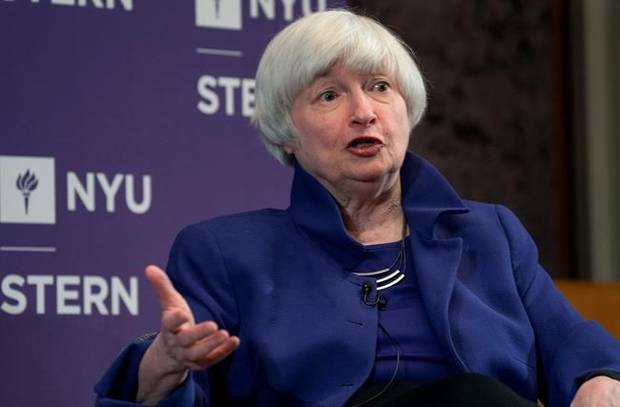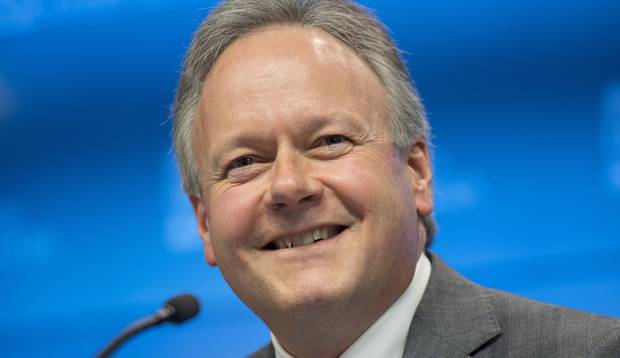Briefing highlights
- Loonie could see some upset
- What to expect from the Fed
- Markets at a glance
- Morneau to outline tax changes
- Home prices to climb in Toronto: forecast
Loonie watching
The Canadian dollar could be in for a couple of days of unrest as central bankers take centre stage.
But, new research shows, Bank of Canada Governor Stephen Poloz isn't roiling the loonie any more than his immediate predecessors.
First, the next couple of days.
The U.S. Federal Reserve is widely expected to raise its benchmark rate by one-quarter of a percentage point this afternoon. While economists see that as a virtual given, markets will be watching closely for new projections from the Federal Open Market Committee (FOMC), the U.S. central bank's policy-setting group, and what chair Janet Yellen has to say in her news conference that follows.
Michael Gregory, Bank of Montreal's deputy chief economist, expects little change in today's policy statement, and probably "some technical tweaks" to the FOMC's projections.
"Where we could see more meaningful shifts is in the unemployment rate," Mr. Gregory said, noting that the U.S. jobless level is now at 4.1 per cent, down from 4.4 per cent during the last round of projections.
As for the news conference, Ms. Yellen is on her way out, with just one more meeting to go after this before Jerome Powell, President Donald Trump's choice, takes the helm.
"No doubt she'll be asked by the media about a potential Fed reaction to a $1.4-trillion net tax cut," Mr. Gregory said.
"Her answer will be coy," he added.
"But with the output gap now closed and the economy essentially at full employment, with household spending and business fixed investment already growing decently (particularly the latter), and with inflation finally showing signs of turning up again, we suspect she'll be biting her tongue to avoid saying what she really thinks."

Federal Reserve Chair Janet Yellen participates in a moderated discussion at New York University’s Stern School of Business, Tuesday, Nov. 21, 2017, in New York
CRAIG RUTTLE/THE ASSOCIATED PRESS
Ms. Yellen will be followed on Thursday by Mr. Poloz, who speaks to the Canadian Club in Toronto about the issues that keep him up at night.
Here's how it all might affect the Canadian dollar, which tumbled last week when the Bank of Canada broadcast its caution, signalling it's in pause mode for now after raising its benchmark overnight rate twice this year, to 1 per cent.
One of the things markets will be watching for today is the so-called "dot-plot," the signal from Fed members on how interest rates might progress.
"An upward shift in the median 'dot' for 2018 could see the USD strengthen across the board - including against the loonie," said Bipan Rai, executive director of macro strategy at CIBC World Markets, referring to the U.S. dollar by its symbol.
"Poloz's speech on Thursday will give markets something to chew on as we head into the holiday break," he added.
"Our view is that the bank is on hold until the spring, and we expect the governor to again emphasize the importance of waiting to see how the economy is adjusting to the two rate hikes from earlier this year. That could hit the [Canadian dollar] to a degree given the positioning in the futures market is still long."
Mark McCormick, North American head of foreign-exchange strategy at TD Securities, agreed the loonie could be in for some unrest depending on how things play out.
"The Fed is likely to be a non-event since the rate hike is priced in and the composition of the Fed is likely to look much different next year," Mr. McCormick said.
"The offsets are a possible bump in the dot-plot versus Yellen discussing the prospects of lower-for-longer inflation," he added.
"The latter reflects the pivots towards a tone that is a bit more dovish in the hopes of a meaningful bounce in inflation next year. It appears some policy makers are starting to take more seriously the notion of structural changes in inflation. Even so, a bump in the dots could partially offset a dovish Yellen, so more volatility but little directional bias for the dollar."
As for Mr. Poloz, "a discussion around the things that keep him awake at night is more likely to tilt towards negative risk factors than the positive ones."
So when you put it all together, over the next couple of days there are "increased two-way risks for [the Canadian dollar] with a bias towards weakness, but we still think the pair holds the highs near 1.2920," Mr. McCormick said, meaning a loonie at just below 77.5 cents (U.S.).

Bank of Canada Governor Stephen Poloz speaks at a news conference after release of the financial system review in Ottawa, Nov. 28, 2017
JUSTIN TANG/THE CANADIAN PRESS
Mr. Poloz can, and oft does, move the loonie, which you'd expect from a central banker.
But, contrary to what some say, Mr. Poloz hasn't done so any more than his predecessors, according to new research from Derek Holt, Bank of Nova Scotia's head of capital markets economics.
"Volatility is more driven by the circumstances of the day, while there is no hard evidence that currency markets are more volatile under Poloz than his predecessors," Mr. Holt said in a report, having charted the action under the current Governor and former governors Mark Carney and David Dodge.
"He has definitely had an impact on the currency, with sudden swings in both directions being driven by shifts in BoC communications this year and last," Mr. Holt added later.
"There isn't, however, clear evidence that Poloz has done this any more or less than his predecessors, which suggests some of the comparative criticism is misinformed. I think market participants are focused upon the recent evidence, and perhaps forgetting that the BoC has roiled markets during pretty much every governor's tenure."
Read more
- Loonie slumps as Bank of Canada’s Poloz ‘continues to get cold feet’
- Barrie McKenna: Bank of Canada stays cautious, keeps rates on hold
- Ian McGugan: A shift in inflation is taking shape and investors may end up paying a big price
- Canadian dollar could plunge to 72.5¢ on NAFTA ‘crash-out’
- Get your loons in a row: ‘Investors should protect themselves against NAFTA termination risk’
- ’Buckle up’: It would take $100 oil to stop the Canadian dollar from skidding to 75¢
- Threat of Canadian financial crisis eases (but don’t take that to the bank)
Markets at a glance
Read more
Morneau to unveil tax changes
Canada's finance minister plans to unveil details of small-business tax changes today.
That will leave business owners just over two weeks to prepare for the changes, The Globe and Mail's Bill Curry writes.
Bill Morneau is expected to outline how the Canada Revenue Agency will determine when they can use "income sprinkling" with family members.
Read more
More news
- Janet McFarland: Home prices set to climb on buyer demand in GTA: forecast
- U.S. core CPI slows in November, apparel prices tumble
- Empire to convert some Safeway, Sobeys stores to FreshCo banner in Western Canada